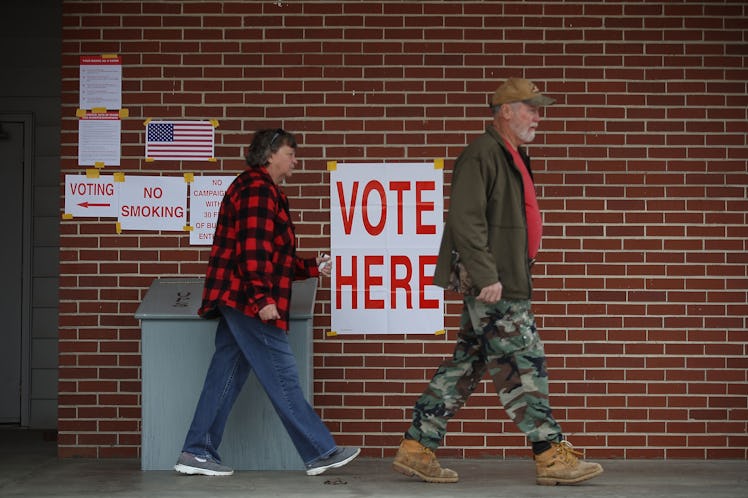
Twitter Is Super Stressed Over 'The New York Times’ Election Needle & The Alabama Election
Late on Tuesday evening, the race for Alabama's vacant Senate seat was too close to call — and honestly, The New York Times wasn't helping things. Tweets about The New York Times' election needle and Alabama as the votes were coming in were just plain freaking out. Because it's not like we didn't know that this race was tight, guys.
More than two hours after the polls in Alabama closed, and with more than three quarters of votes in, the difference between the GOP's Roy Moore and Democrat Doug Jones was less than half a point, per CNN. So "nailbiter" didn't even begin to cover it. And with one of the two seats that made up the GOP's Senate majority on the table, the stakes were high.
So seriously? Everyone, on both sides of the aisle, were freaking out, and freaking hard. And The New York Times' election needle, which measures both the estimated vote margin and and the respective candidates' chances of winning, is really not helping anyone's blood pressure. At the start of the night it gave Jones a likelihood of winning, but with the votes coming in throughout the night neck and neck, with first Moore, then Jones, then Moore again, taking the lead, no one was really sure what to think.
So needle? You weren't helping.
Of course, the whole thing was even more stressful because of the whole 2016 election prediction Thing.
Back in 2016, The New York Times predicted with a pretty solid certainty that Hillary Clinton was on track to win the presidency. As we all know with the hindsight that is living in 2017, that didn't come to pass, and we all learned our lesson about relying on the infallibility of polls.
So some people were looking at the needle with just a soupçon of skepticism.
But honestly, the needle was only another barometer of uncertainty in an incredibly contentious race. Alabama is a solidly red state which has voted Republican for the last ten presidential elections, and in 2016 voted for Donald Trump by a margin of 62 to 34.
But in the Dec. 12 Senate election, the Republican candidate ended up being distasteful to many. In early November, news broke that Moore had been accused of sexual misconduct with teenage girls, the youngest of whom claims she was 14 when the then-32-year-old allegedly touched her intimately. Moore has denied the allegations. Moore was also known for what some saw as "virulently" anti-gay beliefs and homophobic remarks, including saying that what he called "homosexual conduct" should be illegal.
Across the country, many saw the Alabama election as a microcosm of the political situation at large, particularly as heavy hitters in both parties took sides on the Alabama race. On the Democratic side, former President Barack Obama and former Vice President Joe Biden both stumped for Jones, recording robo-calls and publicly supporting him. Across the aisle, Donald Trump recorded his own robo-call in support of Moore, as well as tweeted an endorsement of the scandal-troubled candidate.
But by the end of the night, the needle's judgement was proven. Shortly before 10:30 p.m. ET, Jones was announced the winner of the Alabama race for U.S. Senate, in an upheaval that, honestly, had everyone just losing it.
Jones won by just about 1.5 percent, or around 21,000 votes, according to CNN, so it's not exactly a landslide, but hey, it's enough.
So no matter which way you lean politically, you can go ahead and take a deep, deep breath. Pour a glass of wine and try to get your heart rate down. It's all over.
Or at least, it's over until 2018 — but we'll cross that bridge when we get to it. For now, just everyone keep an eye on your blood pressure (and not the New York Times' election needle), kay?